- Home
- Charles L. Grant
The Sound of Midnight - An Oxrun Station Novel
The Sound of Midnight - An Oxrun Station Novel Read online
THE SOUND OF MIDNIGHT
Charles L. Grant
Smashwords edition published at Smashwords by Crossroad Press
© 2012 Charles L. Grant Estate
Copy-edited by: Patricia Lee Macomber
Cover Design By: David Dodd
Background Images provided by:
http://nevertakemystock.deviantart.com
http://wyldraven.deviantart.com
LICENSE NOTES
This eBook is licensed for your personal enjoyment only. This eBook may not be re-sold or given away to other people. If you would like to share this book with another person, please purchase an additional copy for each person you share it with. If you're reading this book and did not purchase it, or it was not purchased for your use only, then you should return to the vendor of your choice and purchase your own copy. Thank you for respecting the hard work of this author.
OTHER CROSSROAD PRESS PRODUCTS BY CHARLES L. GRANT
The Oxrun Station Series
The Grave
The Last Call of Mourning
(More Oxrun Station books coming soon)
The Curse
Buy Direct From Crossroad Press & Save
Try any title from CROSSROAD PRESS – use the Coupon Code FIRSTBOOK for a one-time 20% savings! We have a wide variety of eBook and Audiobook titles available.
Find us at: http://store.crossroadpress.com
Author's Dedication
For Ed:
Who found me first and keeps me working,
And refuses to let me be anything but better;
Welcome to Oxrun, there's a hearth here for you,
And a full moon and nightmares, and a shadow or two.
CHAPTER I
The sun, the afternoon, the park was warm. The last spring chill had died with dawn, and Oxrun Station stored its sweaters into cupboards, mittens into drawers, and watched the traffic on Mainland Road grow thick with campers braving into the mountains. Had it been a weekday, half the schoolchildren would have devised excuses to stay home, and the rest would have spent their learning hours staring out the windows wishing they were somewhere else. It was, however, early June and a green Saturday, with the field in the center of the park spotted with shrill games of baseball, stubborn remnants of football, stampedes of tag over grass that refused to be beaten. The winding tarmac walks became lanes for carriages, trails for bicycles, paths for couples to leave as they found and rediscovered places behind the shrubs and beneath the hickory where they could spread their blankets and promise the moon. Redwood-and-concrete benches floated in and out of twisting shade, while a refreshment kiosk offered the season's first chocolate cone. An old man with a gray canvas sack poked listlessly with a pointed stick at last year's leaves; another leaned against a sapling and clucked to the squirrels.
Only the water in the pond was cold.
Despite the new broad canopy that blended all the trees into one, Dale could glimpse spears of sunlight captured in the water as she crossed the lower field, avoiding the children, ignoring the shrieks that frightened the birds. When she had been the age of the players in the park, she sat on a swing behind High Street Grade School and told her troubles to the dusty red brick. Sometimes it actually worked, but more often it only confused her, and it wasn't until she had grown and left and returned again that she realized it had been the solitude she was after, not the comfort of faded false stone.
Now, in the sun and the warm, there was the pond.
It was a bloated L, large enough to permit a small rowboat or two, small enough to grant the average swimmer the prize of crossing its width. Because of the spring that fed it, however, only a few dared more than wade, and so it was generally shunned until December froze it and brought out the skates.
Leaving the field and the games behind, then, she followed a worn, narrow path until she reached the band of mown grass and weeds that bordered the black water. Standing quietly for a moment on the high bank, she watched a green-capped drake feeding in the shallows while his drab mate and anxious young clustered a few yards distant. Then she turned right and followed the edge until she was facing east and the village was at her back. A lonely elm had punched into the center of a half-circle clearing, and she sat on one exposed root, her view of the water unobstructed except for a treed finger of land halfway between her and the far shore. When the drake finally stopped its bobbing and settled himself with a preening shake, she smiled and saluted him silently.
A light breath of wind ruffled her thin blue blouse, shifted the broad cuffs of her slacks to cover her shoes. She shivered, though she didn't feel cold, and opened a paper bag out of which she lifted her sandwich lunch. She was trying not to think, rather to concentrate on the taste of the ham and the lettuce and the freshly baked rye Mrs. Inness had brought to the shop that morning. And when that failed, she poked out a tiny mirror from her purse and tried to put sense back into the more blond-than-brown hair she'd hoped keeping short would make easier to manage. But the mirror stayed on her faintly green eyes, and they were frowning, half in anger, half in worry.
A quick gust from the north intensified the cries of the games, dusting her gratefully until it and they returned to the background. She grabbed a stone and threw it viciously into the water; the sound of its sinking decidedly unsatisfactory.
It had promised to be a good day right from the beginning. She'd slept well, showered and dressed to the accompaniment of her slightly flat alto, had even taken time to eat a rare full breakfast; she walked instead of ran the few long blocks to the store, and was whistled at by an unseen passenger in a speeding car.
Good omens all, and capped by the brilliance of the sun that rose over the park.
After opening the shop, she was given a few blessed minutes to herself before Bella Inness arrived. It wasn't, she'd thought guiltily, that the old woman was actually hurting sales, far from it, but she was too steeped in the store's short traditions to give her full approval to the changes Dale had made. Bartlett's Toys had been her parents' business, a neighbor's family's before that, and had always carried nothing but children's toys, toddlers' clothes, and a select line of demure greeting cards. Dale had realized the nature of competition as soon as she'd taken over, however, and eliminated the clothes and cards and replaced them with games and recreational oddities that would appeal to more than just kids. The fact that the change was successful irritated Mrs. Inness, and a day seldom failed to end without some mention of memories' sacrilege.
It was a friendly though uneasy relationship, based in part on the fact that she had promised her father that no matter what happened to anyone in the family, someone must be sure to keep Bella on the job: she had no one of her own, and without the store she would probably fall into rapid decline. In more ways than one, the store was her life. Friendly, and uneasy; and when Bella had pushed her inevitable broad-striped dress through the door that morning, Dale had tensed, waiting for the opening salvo, the crack, the sniping from the protection of old age and gray hair. But there'd been nothing but a laughing greeting, a cheek offered for a passing sterile kiss. And the morning had drifted lazily without a hint of trouble.
She reached down and yanked at a tuft of grass. An ant scrambled along a blade and she shook it gently to the ground where it hesitated before moving off purposefully in the direction she'd interrupted.
A good day.
Until Ed McPherson, psychiatrist and chess-set collector, changed it. He came into the store as she was working on the display case beneath the counter by the entrance, where she also kept the register. He'd entered as he always had—slowly, deliberately, his bespectacled puffed face turne
d intently toward the case and the chessmen arranged within. He'd nodded as she moved aside, examined the pieces while pulling on the fall of brown hair that swept down and over his brow.
"Nothing new," she'd said brightly, and he'd frowned.
"You're sure about that?"
"Well, if I don't know, who does?" she'd said, forcing a laugh, hoping that for once he'd loosen his professional strait jacket, a metaphorical garment donned, she thought, since the death of his wife at home, found drowned in the bathtub, a tragic accident. Yet she always anticipated his coming because of his intense pleasure in the exotic chessmen she brought in from as many cultures as possible, and at the same time dreaded their conversations because he made her feel as though she was in his office, on the couch or wherever he placed his patients, spilling out her life story while he grunted and took notes.
"Nothing from Dave Campbell?"
His wife, Elinor, he'd once told her, never played chess and thought his collection ridiculous.
Now she was dead, and Ed was . . .
"Nothing from Dave Campbell?" he repeated.
"Nope," she said. "He hasn't brought any of his things in to me for a while, in fact. Certainly not a new chess set." And she was startled when the psychiatrist scowled and left without speaking.
"Well, good-by to you, too," she'd muttered as she watched him cross the street without regard for traffic. "Killjoy."
Her mood lightened, however, when Willy Campbell, Dave's son, came in just before twelve and headed directly for the ship models in the back left corner. Bella, standing by the counter, adjusted her bifocals and plumped her sagging bosom. "Watch his coat carefully, Dale," she whispered, loudly enough for the boy to hear. "He gets fat when he leaves those boxes."
"Bella, leave the boy alone."
"He's too young for them things," had been the answer. "He's only nine or ten, you know. He can't do all that little stuff with the rigging, and things."
"Bella, for crying out loud, his father probably helps him."
Bella glared at the reprimand, shoved her away and down the aisle where she hovered at the boy's shoulder until he glanced up, smiled and waved to Dale. Then he picked up a box nearly as large as himself and, shaking off Mrs. Inness' "May I assist you, young man?" he struggled to the counter and set it down.
"Willy," Dale said, "this one is going to take a hundred years, you know that? It's a clipper ship, right?"
"I know, Miss Bartlett," he said. "I can tell by the picture." She shook open the largest paper sack and eased the box in. "Your dad going to help you with this?"
Willy sobered. "He never does, Miss Bartlett. I do it all myself. I learn better that way."
Bella, who'd stationed herself by the door, snorted.
"Well, I do!" the boy protested. "I do it all myself. All."
"I'm sure you do, Willy," Dale said, handing over the awkward package. "Mrs. Inness, would you open the door for this young man?"
Willy grinned and waited until Bella complied. Then, with one foot out, he stopped and looked up at her. "May I assist you, young man?" he said, laughed, and ran to the sidewalk.
If the door had not been on a spring, Bella would have slammed it. Instead, she fisted her hands on her hips and glared at Dale. "Spoiled little monster. You shouldn't be so friendly with them, Dale. They'll turn on you like snakes."
Dale blinked, not sure of the allusion.
"Your father, now, would never have—"
"My father is dead, Bella."
"Dale! So soon in the grave and already you're forgetting—"
"Three years isn't soon, and I'm forgetting nothing. Now why don't you bring out more of those bookshelf games. We've too many of the same ones on display. Change it around a little."
Mrs. Inness' hand lifted, and Dale was sure it'd been heading for the doorknob. Instead, it attempted to pat some dignity into her bulk as she turned and headed stiffly back toward the storeroom.
Poor Will, she thought as she tossed another stone in the water. Poor me.
For a moment, then, she wished that Vic were with her. Vic, who taught the kids in the high school that teachers weren't all ogres, and who tried to teach her that it wasn't a crime to enjoy life and living. He had never proposed, not in so many words, but she knew that the words were there, waiting, until she had gotten over being afraid that he might leave her, too.
It was not unusual, she thought when her wish for Vic faded, that there had been nothing in her life to prepare her for the airplane crash that had taken both her parents' lives on the side of a Colorado mountain—but neither was there a Bartlett tradition of prolonged and agonizing mourning. It had been tragic, and she had cried herself to sleep in the house now hers for weeks on end, then only sporadically; but it was now done. Over. Just like the decision to postpone graduate school to work at the store until a buyer came along.
And when he had, she refused to sell.
She had discovered joy in the business: clothes were things that people needed to buy, but a game, a toy . . . she grinned at herself.
Much of that, she was forced to admit, had been Vic's doing. Often, he came into the store and opened the boxes of things he hadn't seen before, spread the game/toy/puzzle on the counter and spent hours trying to figure it out, or watching it click into motion, or simply laughing at the mind behind the creation. At first she had thought him childish, until his laughter had become infectious and his delight in the new and the bright and the maddeningly complex had taken her and transformed her.
The buyer had been refused because her mourning had been done.
And Vic was still there, waiting patiently for her to make up her mind. Not a martyr to love, because he dated others without apology; but a friend waiting to be more, whenever she decided it was time and she was ready.
Games. Toys. Another grin, and her anger at Bella, well-meaning Bella with her rare small smile, her anger at invoking her parents' memory faded, and was replaced by a brief wash of sympathy for Willy Campbell, who tried so hard, too hard, to be older than he was. Not that the other children who frequented the shop didn't play the adult game, too, but Willy strove rather than played, struggled rather than larked. Were he a genius, a prodigy, he might have pulled it off—but he was the Oxrun average, and nothing he did was able to alter that image in anyone's eyes but his own.
She leaned back and pressed her head against the elm's bark, staring through the lattice that fragmented the sky. Her lunch sat heavily and she chided herself for not bringing anything to drink. Somehow she was going to have to apologize to Bella for embarrassing her in front of the boy. That had been a serious error and she should have known better, but there were days when the woman's intolerance was simply too much to pass over; and if she hated the kids so damned much, why did she bother to stay on?
Another grin. That one was easy. Bella was afraid that without her, Dale would drive the store into bankruptcy, defame the Bartlett reputation, drive the Station into a depression, and leave her without an outlet for her grumpiness.
Suddenly the day seemed to be turning again. McPherson was forgiven his stodginess, Bella her suspicions. She sat up and stretched. The drake had assembled his family and was leading it away from her, straight across the center of the pond toward the spit of land that severed the western tip from view. A dragonfly lifted from the low weeds and darted toward her, swerved when she instinctively ducked, and vanished. She remembered the year the water had been clogged with lily pads and the bees that swarmed over the blossoms white and yellow had stung quite a few of the children playing on the banks. That winter the pond had been drained, the pads killed at the roots and diligently weeded thereafter. Safer, perhaps, but somehow such a body of water seemed naked now without the scattered blotches of green.
A glance at her watch made her gasp silently, grab for the empty bag, and rise. Her legs were stiff, her knees cracked. She stretched again, shook her head vigorously, and turned to cut back through the trees to the Park Street entrance. A single
step, and she heard a scream.
At first she thought it her imagination, a squeal of brakes from a nearby street. She listened, but there was nothing; turned, and it came again. When she whirled, the drake was pushing its mate and ducklings rapidly toward the far side of the pond.
A third time, and Dale broke into a run, staying as close to the lip of the bank as she could, staring into the shadows to locate the source of that terror. Now the scream had multiplied, and she could hear splashing and knew that someone had fallen into the water and couldn't get out. A winter-cut branch hidden in tall grass tripped her, but she flailed and kept her balance. Across the pond she could see other adults breaking through the trees from the field, heading around the other side. No more than a half dozen, but by their speed she guessed they could see what she could not.
Then she passed the finger of land barely wide enough for three trees abreast and, emerging from the thick underbrush, saw the children standing quietly on the low, muddy bank. She stopped, hesitant, then dashed forward, scattering them as she searched them for familiar faces.
"Carolyn, what's wrong?" she demanded of one small redhead. The girl only stared up at her and began to cry. When she stepped aside, nudging her friends to do the same, Dale saw the body.
A small boy, his face down in the mud, his legs stretched into the water, floating. Leaves were pasted to his hair and the back of his neck. He was drenched, and fully clothed. Without thinking, Dale knelt and turned him over.
"Oh my God, Willy!"
"He wanted a duck, Miss Bartlett," one fearfully small voice said. "He went in to get me a duck and he fell and started making all them noises."
"A monster got him, Miss Bartlett," a quivering, solemn boy told her. "Came right up and grabbed him."

![[Oxrun Station] The Orchard Read online](http://i1.bookreadfree.com/i/03/17/oxrun_station_the_orchard_preview.jpg) [Oxrun Station] The Orchard
[Oxrun Station] The Orchard![Riders in the Sky - [Millennium Quartet 04] Read online](http://i1.bookreadfree.com/i/03/20/riders_in_the_sky_-_millennium_quartet_04_preview.jpg) Riders in the Sky - [Millennium Quartet 04]
Riders in the Sky - [Millennium Quartet 04]![Chariot - [Millennium Quartet 03] Read online](http://i1.bookreadfree.com/i/03/19/chariot_-_millennium_quartet_03_preview.jpg) Chariot - [Millennium Quartet 03]
Chariot - [Millennium Quartet 03]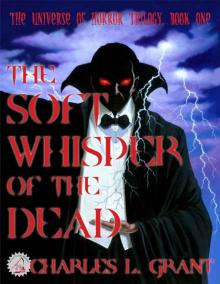 The Universe of Horror Volume 1: The Soft Whisper of the Dead (Neccon Classic Horror)
The Universe of Horror Volume 1: The Soft Whisper of the Dead (Neccon Classic Horror)![[Oxrun Station] Dialing The Wind Read online](http://i1.bookreadfree.com/i/03/19/oxrun_station_dialing_the_wind_preview.jpg) [Oxrun Station] Dialing The Wind
[Oxrun Station] Dialing The Wind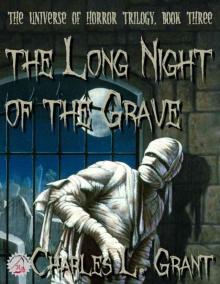 The Universe of Horror Volume 3: The Long Night of the Grave (Neccon Classic Horror)
The Universe of Horror Volume 3: The Long Night of the Grave (Neccon Classic Horror) The Grave - An Oxrun Station Novel (Oxrun Station Novels)
The Grave - An Oxrun Station Novel (Oxrun Station Novels)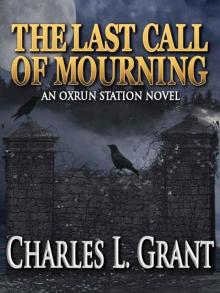 The Last Call of Mourning - An Oxrun Station Novel (Oxrun Station Novels)
The Last Call of Mourning - An Oxrun Station Novel (Oxrun Station Novels)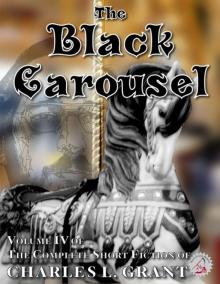 The Complete Short Fiction of Charles L. Grant, Volume IV: The Black Carousel
The Complete Short Fiction of Charles L. Grant, Volume IV: The Black Carousel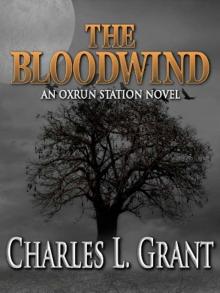 The Bloodwind - An Oxrun Station Novel (Oxrun Station Novels)
The Bloodwind - An Oxrun Station Novel (Oxrun Station Novels)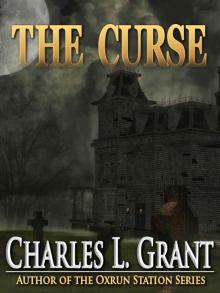 The Curse
The Curse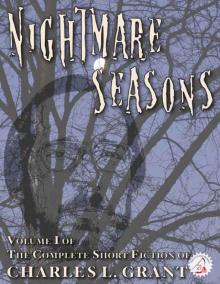 The Complete Short Fiction of Charles L. Grant Volume 1: Nightmare Seasons (Necon Classic Horror)
The Complete Short Fiction of Charles L. Grant Volume 1: Nightmare Seasons (Necon Classic Horror)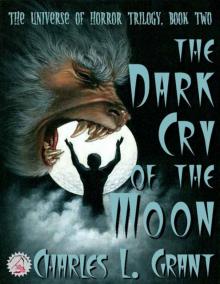 The Universe of Horror Volume 2: The Dark Cry of the Moon (Neccon Classic Horror)
The Universe of Horror Volume 2: The Dark Cry of the Moon (Neccon Classic Horror)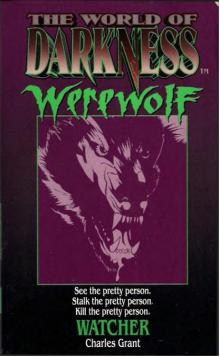 Watcher: Based on the Apocalypse (World of Darkness : Werewolf)
Watcher: Based on the Apocalypse (World of Darkness : Werewolf)![[Oxrun Station] The Bloodwind Read online](http://i1.bookreadfree.com/i/03/25/oxrun_station_the_bloodwind_preview.jpg) [Oxrun Station] The Bloodwind
[Oxrun Station] The Bloodwind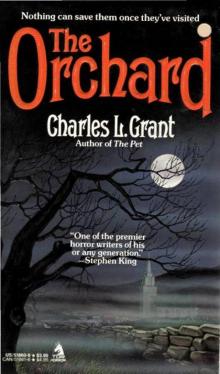 The Orchard
The Orchard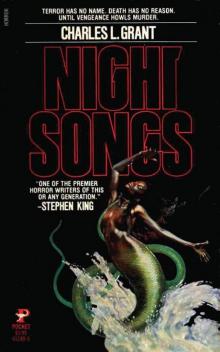 Night Songs
Night Songs Shadows 3
Shadows 3![Symphony - [Millennium Quartet 01] Read online](http://i1.bookreadfree.com/i1/04/02/symphony_-_millennium_quartet_01_preview.jpg) Symphony - [Millennium Quartet 01]
Symphony - [Millennium Quartet 01] The Hour of the Oxrun Dead (Necon Classic Horror)
The Hour of the Oxrun Dead (Necon Classic Horror)![In the Mood - [Millennium Quartet 02] Read online](http://i1.bookreadfree.com/i1/03/31/in_the_mood_-_millennium_quartet_02_preview.jpg) In the Mood - [Millennium Quartet 02]
In the Mood - [Millennium Quartet 02]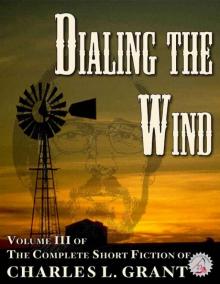 The Complete Short Fiction of Charles L. Grant Volume 3: Dialing the Wind (Neccon Classic Horror)
The Complete Short Fiction of Charles L. Grant Volume 3: Dialing the Wind (Neccon Classic Horror)![[Oxrun Station] The Last Call of Mourning Read online](http://i1.bookreadfree.com/i2/04/05/oxrun_station_the_last_call_of_mourning_preview.jpg) [Oxrun Station] The Last Call of Mourning
[Oxrun Station] The Last Call of Mourning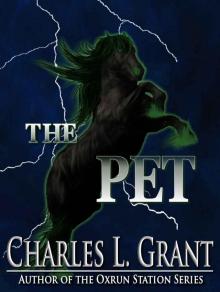 The Pet
The Pet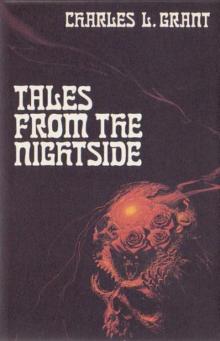 Tales from the Nightside
Tales from the Nightside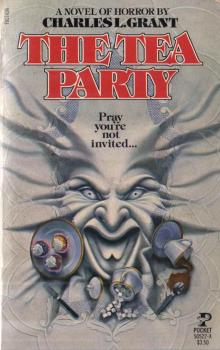 The Tea Party - A Novel of Horror
The Tea Party - A Novel of Horror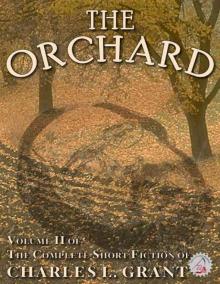 The Complete Short Fiction of Charles L. Grant Volume 2: The Orchard (Necon Classic Horror)
The Complete Short Fiction of Charles L. Grant Volume 2: The Orchard (Necon Classic Horror) Whirlwind
Whirlwind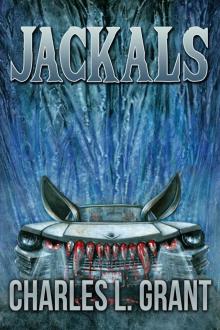 Jackals
Jackals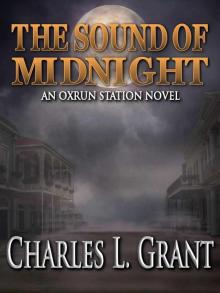 The Sound of Midnight - An Oxrun Station Novel
The Sound of Midnight - An Oxrun Station Novel